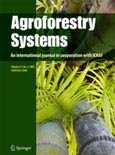The COVID-19 pandemic, including the health impacts of the virus itself and measures to contain and mitigate them, has far-reaching impacts on economies, value chains and livelihoods. The pandemic has revealed the extent of vulnerability in our societies to risks and shocks. Indeed, most of these vulnerabilities were triggered or amplified by the crisis or its responses.
CIFOR-ICRAF has organized a Rapid Research Response to identify the impacts of the pandemic on woodfuel value chains in the Democratic Republic of Congo (DRC). This serves to better identify and address risks and vulnerabilities in agriculture and forestry. This, in turn, helps strengthen resilience in landscapes, value chains and the livelihoods of people who depend on them, all to “build back better.”
Download:
DOI:
https://doi.org/10.17528/cifor/008076Score Altmetric:
Dimensions Nombre de citations:
Année de publication
2021
Auteurs
Schure, J.; Kasereka-Muvatsi, L.; Cerutti, P.O.; Sola, P.
Langue
English
Mots clés
fuelwood, supply chain, pandemic, landscape conservation, charcoal, energy consumption
Géographique
Democratic Republic of the Congo



















